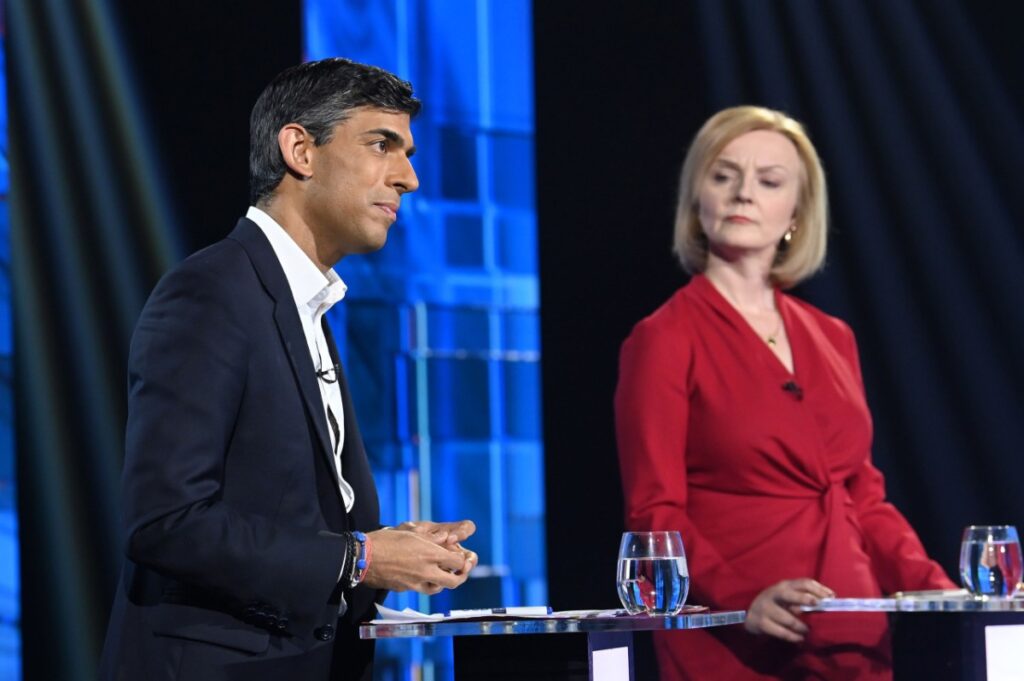With two monarchs and three prime ministers, 2022 was a turbulent year in the UK. It was also bleak. Inflation hit 11%, interest rates rose from 0.25% to 3.5%,energy bills doubled, wages fell, and the UK faces the biggest fall in living standards in 60 years. Nothing seems to work anymore. Trains are not running, doctor’s surgeries are full, ambulances cannot reach people in time, and delays for services such as passports are getting longer. 2022was also the year that many people decided they had had enough. The year ended with strikes, about pay and underinvestment in public services, across the UK by railway and postal workers, driving examiners and border control staff, bus drivers, barristers and teachers and, for the first time ever, nurses. This turmoil is a symptom of the UK’s identity crisis as the country searches for a way out of the mess it finds itself in.
A crisis of governance and loss of a sovereign
In 2022, Prime Minister Boris Johnson was finally consumed by his lies and recklessness. His excuses about parties at 10 Downing Street when everyone else was in Covid lockdown wore thin. When, in July, Johnson again lied about not knowing about accusations of sexual misconduct against Chris Pincher, before appointing him to a sensitive government job in February, it was game over. 57 ministers resigned in one day. Johnson was now an electoral liability and the Conservative party dumped him in July. The UK, famous for its humour, no longer wanted to be led by a clown.

With Johnson gone, the Conservative party made Liz Truss prime minister in September. For Truss and her supporters, the very purpose of Brexit (the UK’s exit from the European Union) was to make the UK a small state, low-tax, low-regulation country, closer to the US than continental Europe. Truss’ plans for big tax cuts for the rich, was warmly welcomed by right-wing commentators and the media, but not by the financial markets. The UK economy crashed. Sterling’s value fell, interest rates increased, and the Bank of England had to rescue UK pension funds. Truss was an electoral liability. The Conservative party dumped her too. The UK government was in chaos…again!
Truss lasted 49 days as prime minister.It may have been even fewer days but for the 10 days of mourning following the death of Queen Elizabeth II in September 2022. Millions queued for hours to pay tribute to the Queen who had made the monarchy the most respected UK public institution. Her beautifully choreographed funeral and the smooth transfer to King Charles III reminded people of a UK that was organised and reliable, powerful and respected. But it also reminded people of a colonial past and of an empire that, for many, was not happy and glorious. In May 2022, on a disastrous Royal tour of the Caribbean, Prince William and Princess Kate encountered demands for reparations of profits from slavery. The clash of views about the UK’s history grew louder in 2022.
Net migration into the UK in 2022 was around 504,000- the population of Leeds, the UK’s eighth largest city – prompting demands to reduce immigration. A problem that Brexit was supposed to solve. In contrast, Rishi Sunak becoming the UK’s first prime minister of Indian origin in October made many proud of the UK as a multiracial society. Sunak’s race did not matter. What mattered was what he would do.
For Sunak the UK’s problems are largely due to backlogs caused by the pandemic and energy price increases following Russia’s invasion of Ukraine. Consequently, he proposes to continue the policies of successive Conservative governments since 2010, namely, to reduce government debt through austerity policies that cut public expenditure, stimulate the economy through lower taxes, and to reduce immigration. But by offering nothing new, Sunak may have misread the public mood. Widespread discontent in the UK did not start in 2022. It has built up over the last decade as austerity policies have led to people’s living standards stagnating or falling, and inequality increasing.
For austerity Scotland blames England, arguing that as Conservative MPs from England dominate the UK government and parliament, austerity is an English policy imposed on Scotland. This led to the independence referendum in 2014. Scotland voted 55% to 45% to stay in the UK, but many Scots still want independence. England does not blame austerity. England blames the EU, arguing that rules made in Brussels are holding the UK back. Concerns over immigration from the EU to the UK increased support for Brexit. In 2016the UK voted 52% to 48% to leave the EU. English votes were decisive, but one study showed that those in England who had suffered most from austerity were the biggest leave voters. The strikes that broke out in 2022 have been years in the making.

The Brexit dilemma
In 2022, most people in the UK realised that Brexit was a mistake. UK business, trade and investment are all down. Estimates are that Brexit is costing the UK economy £40bn (Euro 45bn) a year in tax revenues. Brexit continues to threaten the UK’s very existence. Scotland wants another independence referendum, unhappy at being taken out of the EU against its will. Brexit also increaseduncertainty over Northern Ireland’s place in the UK. Under the Brexit agreement Northern Ireland, effectively stayed in the EU Single Market. This has brought Northern Ireland and the Republic of Ireland closer together, not least because Brexit put a ‘border’ within the UK as goods moving between Northern Ireland and Great Britain (England Wales and Scotland) need to be checked. This has pleased those who want to reunite Northern Ireland with the Republic of Ireland and infuriated those who want to keep it in the UK. Throughout 2022, the EU and UK have been trying to find a solution to the ‘border’ problem. The only success is that, so far, the two sides have avoided a trade war.
Knowing Brexit is a mistake is one thing, admitting it is another. The Conservative government denies Brexit was a mistake but cannot point to anything positive it has delivered. The opposition Labour party fears losing support if it proposes a closer relationship with the EU. In 2022, the UK remained paralysed over what to do about the damage Brexit has caused.
Victories not shared
Sporting success in 2022could not lift the gloom. England women’s football team winning Euro 2022, and the England men’s cricket team winning a World Cup, were victories for England, not the UK. England and Wales represented the UK at the Qatar football World Cup, but in a metaphor for the UK’s discord the two teams were drawn against each other. In the Battle of Britain, England beat Wales, who went out at the group stage. The rest of the UK was relieved when England maintained a long tradition of losing in the quarter-finals after missing a penalty, this time to France.

2022 revealed the UK to be not a united, but a very divided kingdom. It showed a nation with a multicultural society that is strong and open enough for a son of immigrants to become prime minister, but which is fearful and insecure over immigration. It revealed a country built on trade refusing to face the consequences of leaving the most sophisticated and successful free trade area in the world, which it helped create -the EU’s Single Market. It exposed the UK as a very rich country (it has 177 billionaires, up from 29 in 2010) with many poor people (14.5 million people – 22% of the population – live in poverty). It exhibited a land of hope and glory whose future is captured by its past. It showed an island race with an identity crisis struggling to define itself and its place in the world. Happy New Year!


